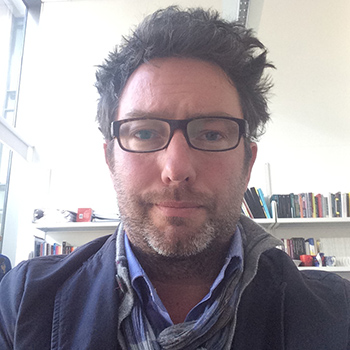
Guatemala Conference: Roddy Brett
USC Shoah Foundation Center for Advanced Genocide Research will host the international conference “A Conflict? Genocide and Resistance in Guatemala,” at the University of Southern California, Sept. 11-14, 2016. The scholars profiled in this series were each selected to present their research at the conference.
Roddy Brett’s research on the genocide in Guatemala began 24 years ago while he was working on his second master’s degree at Cambridge – a decision he made literally overnight.
“I was working with a very good professor on something I wasn’t interested in. A mate of mine was backpacking in Guatemala and sent me a series of documents that were about the genocide,” Brett said. “The next day I changed my research. [Ever since] it’s something I’ve never wanted or been able to shut out of my life.”
Brett is now a lecturer in international relations and director of the Peace and Conflict Studies program at the University of St. Andrews in Scotland. He is author of the forthcoming books The Post-Conflict Legacy of Genocide: Political Violence in Guatemala, Radical Triumph or Revolutionary Betrayal: The History of the FARC, and the recently published Origins and Dynamics of Genocide.
At the conference at USC Shoah Foundation, Brett will draw on his research in Origins and Dynamics of Genocide to discuss the factors that led the government to commit genocide against the indigenous population. Brett said indigenous people were seen as a threat both because they were thought to be aligned with guerilla fighters staging an insurgency, and also because of general racism against them.
“You have these two threats that effectively pushes the state to perpetrate a genocide in the context of counterinsurgency, but I think reading it through counterinsurgency isn’t enough,” Brett said. “I think it was also about a nation building project.”
Brett is also interested in the ways in which civilians do or do not collaborate with insurgency or participate in armed conflicts and political violence.
“If you’re talking about it, maybe other organizations need to sit up and listen”
The conference at USC Shoah Foundation will provide Brett the opportunity to discuss with fellow scholars another key topic: reconciliation and the efficacy of transitional justice in Guatemala. Twenty years after the peace accords were signed, the genocide is still not openly discussed or recognized around the world and “not much has changed” within the country itself, Brett said, leading him to question when, if ever, we should stop attempting reconciliation after a genocide.
He pointed out that usually a country has about five to 10 years after a genocide when it has the world’s attention, resources and funding to rebuild and reconstruct its society. One hundred or more years’ worth of development is forced to happen during that time, a process Brett referred to as “telescoping.” But telescoping can be resisted through the elements that make up transitional justice: the search for truth and peace, reparations, and reconciliation between perpetrators and survivors, which in Guatemala is often dismissed as impunity.
“I think it’s time to take this seriously, this question of reconciliation. When do we stop [talking about it] if ever, what does reconciliation require, what does it mean?” he said. “In that regard the conference can begin to shed light on issues like that.”
While many leading genocide organizations are still unwilling to recognize the Guatemalan Genocide or discuss it in an academic setting, Brett is hopeful that the conference can begin to change the conversation about Guatemala.
“I think it’s significant because the Shoah Foundation of course has respect, visibility, has an incredible reputation in the world,” Brett said. “If you’re talking about it, maybe other organizations need to sit up and listen.”